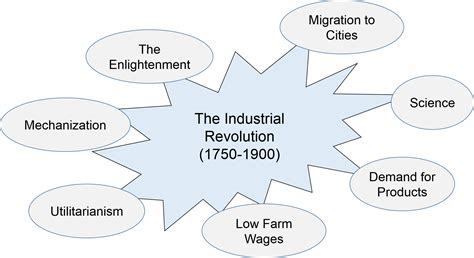The Industrial Revolution, a period of rapid technological advancement that began in the 18th century, profoundly transformed human society. While technological innovations and economic changes were undoubtedly key drivers of this transformation, environmental factors also played a significant role in creating the conditions for industrialization.

Impact of Climate on the Industrial Revolution
Favorable Climates for Energy Production
The Industrial Revolution relied heavily on coal and other fossil fuels for energy. The availability of these resources in abundance in certain regions, particularly in Great Britain, provided a crucial advantage for early industrialization. The temperate climate of these regions allowed for efficient coal mining and transportation, as well as favorable conditions for industrial processes that required significant energy input. In contrast, regions with less favorable climates experienced challenges in energy production and industrialization.
Role of Water Resources in Industrial Processes
Water played a vital role in the industrial processes of the 18th and 19th centuries. From powering watermills and steam engines to transporting raw materials and finished goods, water resources were essential for industrial production. Regions with access to abundant water sources, such as rivers, canals, and lakes, could support the development of industries, while areas with limited water availability faced significant constraints. The construction of canals and other water infrastructure during the Industrial Revolution further enhanced the availability and accessibility of water for industrial purposes.
Natural Resources and Industrialization
Mineral Resources and Technological Advancements
The availability of mineral resources, such as coal, iron ore, and copper, was another key environmental factor that contributed to the Industrial Revolution. These resources were essential for the production of machinery, tools, and other industrial goods. The exploitation of mineral resources led to technological advancements, including the development of steam engines and improved methods of metalworking, which further accelerated the pace of industrialization.
Deforestation and the Need for Fuel
The rapid expansion of industries during the Industrial Revolution led to an increased demand for fuel, primarily in the form of wood and coal. This demand contributed to widespread deforestation, as forests were cleared to provide timber for construction and to meet the growing energy needs of industries. The depletion of forests also resulted in environmental degradation and soil erosion, which had long-term consequences for the environment.
Agricultural Innovations and Industrialization
Improved Agricultural Techniques and Increased Food Production
The Industrial Revolution was preceded by significant advances in agricultural techniques, leading to increased food production and population growth. These developments created a surplus of labor that could be diverted to non-agricultural industries, providing a workforce for the factories and mines that emerged during the Industrial Revolution. Improved crop yields and livestock management practices also contributed to a decline in food prices, freeing up resources that could be invested in industrial ventures.
Environmental Impact of the Industrial Revolution
While the Industrial Revolution brought about unprecedented economic growth and technological progress, it also had significant environmental consequences. The burning of fossil fuels, deforestation, and industrial activities led to air and water pollution, as well as soil degradation and climate change. The long-term environmental impact of the Industrial Revolution continues to affect the planet today.
Conclusion
The Industrial Revolution was a complex historical event influenced by a wide range of factors. Environmental conditions, including favorable climates for energy production, water resources for industrial processes, and access to mineral resources, played a significant role in shaping the course of industrialization. The environmental impact of the Industrial Revolution remains a topic of ongoing study and a reminder of the interconnectedness between human activities and the natural world.
